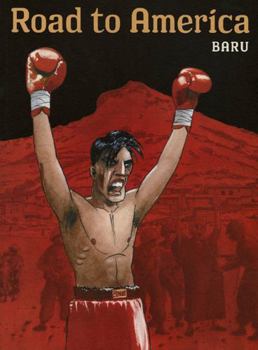Road to America
Select Format
Select Condition 
Book Overview
The acclaimed series from Drawn & Quarterly is finally a graphic novel. An alumnus of Art Spiegelman's RAW and one of France's most exciting talents, Baru has created with twitchy, nervous lines and washes of pale color the tense, sun bleached atmosphere of colonial Algeria in the 1950s. Together two Arab brothers wander the narrow streets of the capital. Tearing the family apart with their loyalties and ambitions, one brother goes underground and joins the fight for his country's freedom from French rule. The other brother takes to the boxing ring and makes a career of fighting with his fists that will make him a European sensation. A graphic novel with cinematic sweep and richly expressive art, the story explodes with the force of a punching fist or a car bomb. This description may be from another edition of this product.
Format:Paperback
Language:English
ISBN:0679754857
ISBN13:9780679754855
Release Date:April 1995
Publisher:Vintage
Length:240 Pages
Weight:0.58 lbs.
Dimensions:0.6" x 5.2" x 8.0"
Customer Reviews
3 customer ratings | 2 reviews
Rated 5 starsAstonishing art and graphic novel
By Thriftbooks.com User,
I loved this graphic novel. The story is great! The artwork is absolutely beautiful. The water-colors (Gouache?) and the movement of the figures are incredible. Five stars for this beautiful book.
0Report





















